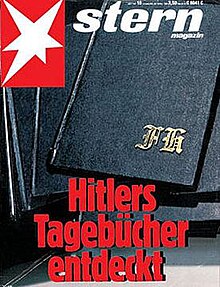
Back مذكرات هتلر Arabic Hitler-Tagebücher AST Hitlerin gündəlikləri Azerbaijani Hitler Diaries BCL Дневниците на Хитлер Bulgarian Diaris de Hitler Catalan Hitlerovy deníky Czech Hitler-Tagebücher German Diarios de Hitler Spanish Hitlerren egunerokoak Basque

The Hitler Diaries (German: Hitler-Tagebücher) were a series of sixty volumes of journals purportedly written by Adolf Hitler, but forged by Konrad Kujau between 1981 and 1983. The diaries were purchased in 1983 for 9.3 million Deutsche Marks (£2.3 million or $3.7 million) by the West German news magazine Stern, which sold serialisation rights to several news organisations. One of the publications involved was The Sunday Times, who asked their independent director, the historian Hugh Trevor-Roper, to authenticate the diaries; he did so, pronouncing them genuine. At the press conference to announce the publication, Trevor-Roper announced that on reflection he had changed his mind, and other historians also raised questions concerning their validity. Rigorous forensic analysis, which had not been performed previously, quickly confirmed that the diaries were fakes.
Kujau, born and raised in East Germany, had a history of petty crime and deception. In the mid-1970s he began selling Nazi memorabilia which he had smuggled from the East, but found he could raise the prices by forging additional authentication details to associate ordinary souvenirs to the Nazi leaders. He began forging paintings by Hitler and an increasing number of notes, poems and letters, until he produced his first diary in the mid-to-late 1970s. The West German journalist with Stern who "discovered" the diaries and was involved in their purchase was Gerd Heidemann, who had an obsession with the Nazis. When Stern started buying the diaries, Heidemann stole a significant proportion of the money.
Kujau and Heidemann spent time in prison for their parts in the fraud, and several newspaper editors lost their jobs. The story of the scandal was the basis for the films Selling Hitler (1991) for the British channel ITV, the German film Schtonk! (1992), and the television series Faking Hitler (2021).
© MMXXIII Rich X Search. We shall prevail. All rights reserved. Rich X Search